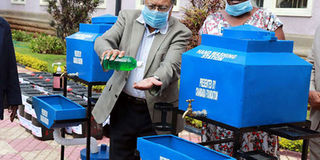Partnering with Kenya to contain Covid-19

Industrialist Manu Chandaria donates handwashing facilities to police in Nairobi on April 6, 2020. PHOTO | DENNIS ONSONGO | NATION MEDIA GROUP
What you need to know:
- The government has taken quick and decisive action, including through early social distancing and movement restrictions.
- Where markets work, cash transfers provide better value for money than in-kind assistance like food, whilst maintaining dignity.
The Covid-19 outbreak has transformed life.
We can feel the economic and health impacts in Kenya, the UK and across the globe. Good people are working hard to support their communities – including those with day jobs who now have little income.
Others are shamelessly trying to exploit the situation. Many of us with office jobs have been able to work from home, where we have become adept at conference calls, trying to keep a routine and balancing the demands of childcare while trying not to snack on unhealthy foods.
It has been decades since we have faced a peacetime challenge like Covid-19. The UK stands with Kenya as one of our strongest partners.
By working together, we will reduce the impact of the virus for both our nations – saving lives, protecting development gains, supporting the economy and helping Kenya bounce back quickly so those most in need reap the benefits.
The G20’s decision on 15th April to freeze debt payments has given 76 economies some breathing space – including some of Kenya’s debt.
On 12 April, the UK announced a global support package of Sh26 billion to UK charities and international organisations to slow infections and save lives globally, including in Kenya.
BEST PRACTICE
The total amount of UKaid committed to the global fight against Covid-19 is Sh97 billion, making the UK one of the biggest donors to the international response. An equally distributed vaccine, will be the best defence.
In Kenya itself, leaders, businesses and communities are leading the way to minimise the economic and social shocks of this public health emergency.
The government has taken quick and decisive action, including through early social distancing and movement restrictions.
Our historic support in Kenya – such as the Public Health Emergency Operations Centre – has been at the heart of Kenya’s Covid-19 response.
We’re redirecting our existing support to tackle the virus – including through multimedia platform Shujaaz, which informs youth heroes in Kenya how to protect their families, tackle false narratives and to help slow the spread.
We are also working with Unicef to provide nutrition, water and sanitation assistance.
The UK already supports the most vulnerable people in Kenya, including the 16 million living in poverty, especially women and people living with disabilities.
Best practice development work enables vulnerable people to provide for themselves and their families.
ECONOMIC STABILITY
Where markets work, cash transfers provide better value for money than in-kind assistance like food, whilst maintaining dignity.
In the context of Covid-19, they offer potential to help young Kenyans whose jobs and income have suffered.
Whilst the direct impact of Covid-19 is growing, it is important that other essential health services continue. For example, many Kenyans need immunisation, as well as maternal and newborn healthcare. We cannot let preventable deaths happen due to pressures on the health system.
Surviving a pandemic needs economic stability too. So it is also important that Kenya remains a regional powerhouse.
Supporting global supply chains – keeping airlines going, freight routes open - is all helping Kenya’s economy. That is why the UK is keeping goods flowing in and out of the country.
Through TradeMark East Africa’s Safe Trade Emergency Facility, the UK and partners will support hygiene measures and technology to ensure supplies, including food and medicines, can flow through borders and ports.
British businesses are some of the top taxpayers in Kenya, providing jobs ranging from horticulture to security to financial services.
Despite the challenges this pandemic presents, this week, Flamingo Horticulture flew 160 tonnes of produce into my UK hometown of Doncaster.
We’ve worked together to tackle shared threats before, and will continue to do so in the face of Covid-19. Twaweza!
Jane Marriott is the British High Commissioner to Kenya: Twitter: @JaneMarriottFCO




